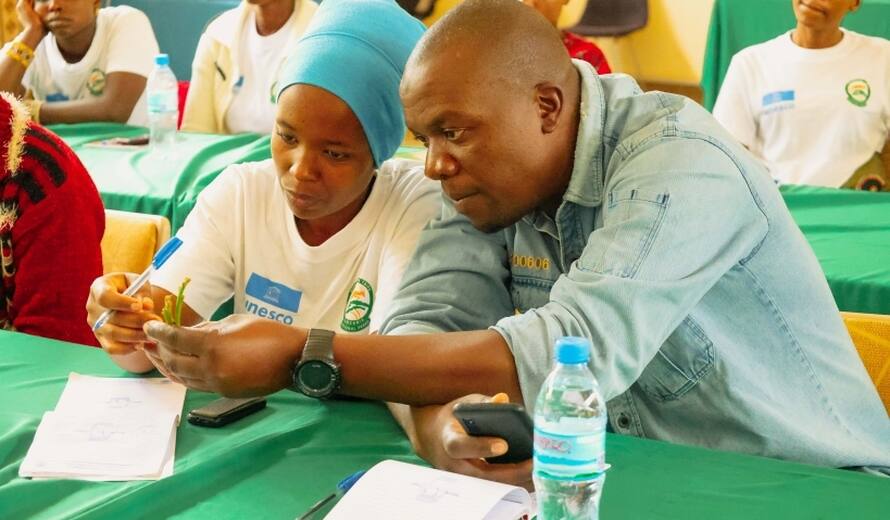UNESCO collaborates with KINAPA to empower young women and men for climate change adaptation
UNESCO in collaboration with the Kilimanjaro National Park (KINAPA) authority have implemented a project titled “Empowering young women and men for adaptation to climate change at the Kilimanjaro National Park World Heritage site” funded by the Netherlands Funds in Trust (NFIT) from 2022 to 2023, as part of its support to the implementation of the Flagship Programme 3 of Priority Africa. Climate change around Mount Kilimanjaro is real and has affected local communities. It is highly linked with prolonged drought and decline of stream/river discharges.
Through the project, KINAPA collected the scientific and traditional data (Traditional knowledge) on impacts of climate change. Data collection focused on nine villages adjacent to the park. Some of the key findings included provision of conservation education awareness on climate change, strengthening conservation of forests and discouraging farming to water sources.
During the implementation of the project, the Park conducted needs assessment to youth’s groups. The assessment showed that, majority of youth from the nine villages adjacent to the park, engage themselves in four main economic activities including agriculture, livestock keeping, tourism activities and retail business. The most ranked economic activities that youth identified as a means to improve their economic status are modern poultry farming (89%), modern avocado farming (78%), modern goat keeping (67%) and vegetable farming (56%). Some of the youth mentioned modern beekeeping and selling agricultural inputs and/or animal feeds. 303 youth were part of the exercise. As a result, Climate change adaptation plan for KINAPA was developed in accordance to the data collected, needs assessment and job opportunities identification.
As part of ensuring sustainable conservation of the site and youth engagement in the process, 18 Youth Conservation Ambassadors were selected. The Ambassadors were trained on climate change, environmental conservation and their role in safeguarding the site. The training led to youth gaining confidence on participating in conservation activities at their villages/communities in collaboration with village leaders and village environmental committees. 73 young women and men between the age of 18 to 28 from villages adjacent to the park participated fully in skills building workshops held in March 2023. They were equiped with entrepreneurship skills, poulty farming knowledge and modern avocado farming skills.
UNESCO, KINAPA, National Commission and Youth Conservation Ambassadors visited a total of six schools, two primary schools and four secondary schools. In all six schools, a total of 1,158 students were reached, 619 girls and 539 boys. In each school, education regarding climate change, conservation and protection of the World Heritage site was shared.
This project was highly relevant to youths around Kilimanjaro National Park as the majority of them were not actively participating in the overall production process. The majority of youths were neither attending village public meetings nor engaging themselves in entrepreneurship groups. The majority of project beneficiaries (youths) were able to formulate entrepreneurship groups, an indicator of good feedback from the youths who attended the workshops. Also, Youth Conservation Ambassadors have been actively engaging themselves in disseminating environmental and natural resources conservation education to the surrounding community as well as helping the park in fighting poaching and environmentally destructive activities.
For more information on the project please contact UNESCO Dar es Salaam

